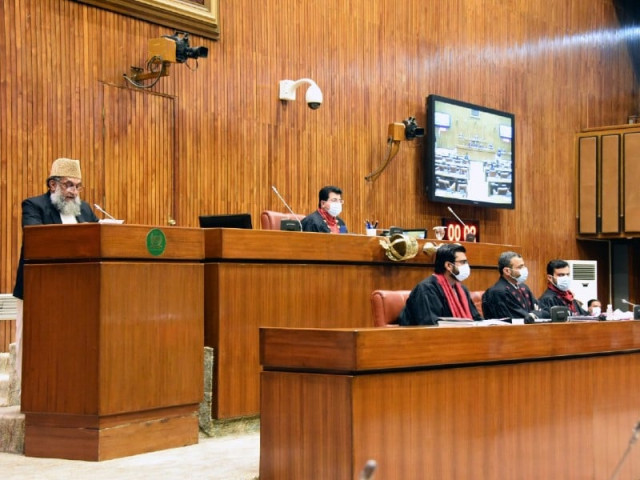ECP empowered to announce poll date
Bill also limits period of disqualification to maximum five years

The Senate on Friday approved a bill empowering the Election Commission of Pakistan (ECP) to unilaterally announce election dates without the need to consult the president.
The Elections (Amendment) Bill 2023 was moved by Minister of State for Law and Justice Shahadat Awan amid protests by senators belonging to Jamaat-i-Islami and the PTI.
According to the statement of objects and reasons of the legislation, the Constitution envisages the duty of the ECP to organise and conduct elections honestly, fairly, and in accordance with the law.
“The ECP enjoys administrative and functional autonomy under the provisions of the Constitution and the Election Act, 2017, which facilitates the body in fulfilling its core obligation of free and fair elections.
“To further strengthen the commission, amendments in sections 57(1) and 58(1) of the Election Act 2017 are required to allow the ECP to announce poll dates for general elections on its own,” it added.
The amendments state: Section 57(1): The commission shall announce the date or dates of the general elections by notification in the official gazette and shall call upon the constituencies to elect their representatives.
Section 58: Notwithstanding anything contained in Section 57, the commission may at any time after the issuance of notification under subsection (1) of that section make such alterations in the election programme announced in that notification for the different stages of the election or may issue a fresh election programme with fresh poll date(s) as may in its opinion to be recorded in writing be necessary for the purposes of this act.
The statement further said that the parliamentary committee constituted by the Senate chairman had also examined the proposed amendments and recommended that the federal government should initiate the process of tabling the legislation.
Taking the floor, Law Minister Azam Nazir Tarar said that the right to choose the date for polls had been given to the ECP in 1973. “But Ziaul Haq gave this right to the president through an amendment,” he recalled, noting that the parliamentary committee had also given a nod in favour of the law.
The Constitution, Tarar continued, was superior. He said the amendments would make the role of the ECP more active and enable changes in the election schedules as well. “This amendment is being brought to remove all the ambiguities,” he told the house, adding that the Parliament had the power to legislate when the Constitution was silent.
Leader of the Opposition Shahzad Waseem, while raising objections to the proposed law, said: “Legislation can only be done under the Constitution.” “The Constitution is very clear about the date of the elections and it gives both the president and governor the power to announce the date for polls,” he said.
Waseem said “parliament is being bulldozed”, adding that according to the law, the president and the governor can give the date of the election. He further stated that “a law in this regard is already present”, saying that “it is not appropriate to give complete authority to the ECP”.
It is pertinent to note that in April the Parliamentary Committee on Electoral Reforms approved the amendments in the Elections Act proposed by Chief Election Commissioner (CEC) Sikandar Sultan Raja.
The parliamentary committee had approved amendments to sections 57-1 and 58 of the Election Act, 2017.
Previously, Section 57-1 read: “The President shall announce the date or dates of the general elections after consultation with the [Election] Commission [of Pakistan].”
However, this has been amended to authorise the ECP to announce the date for the elections.
As for Section 58, it previously stated: “The Commission may, at any time after the issue of the notification under sub-section (1) of that section [57-1], make such alterations in the Election Programme announced in that notification for the different stages of the election or may issue a fresh Election Programme as may, in its opinion to be recorded in writing, be necessary for the purposes of this Act: Provided that the Commission shall inform the President about any alteration in the Election Programme made under this sub-section.”
However, after the latest change, the commission will no longer have to inform the president about any alteration in the election schedule.
‘Limiting disqualification period’
The bill presented in the Senate also included an amendment to Section 232 (Qualifications and Disqualifications) of the Election Act, 2017.
Under the clause, the bill limits the period of disqualification of a person to maximum five years.
The important amendment related to disqualification under Article 62F of the Constitution was presented in the Senate by independent Senator Dilawar, Senator Kahuda Babar, Senator Danesh Kumar, and Ahmed Umer Ahmedzai.
Requesting the Senate to pass the bill today, Senator Dilawar had stated that senior politician Jahangir Khan Tareen and the country's three-time prime minister and Pakistan Mulsim League-Nawaz (PML-N) supremo Nawaz Sharif fell victim to this law.
“In the future, Pakistan Tehreek-e-Insaf (PTI) chairman may also fall victim to this disqualification,” he had added.



















COMMENTS
Comments are moderated and generally will be posted if they are on-topic and not abusive.
For more information, please see our Comments FAQ